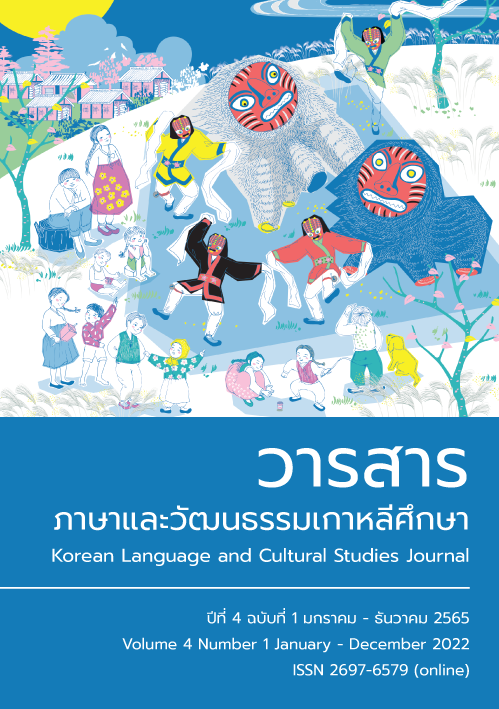The Rage of Young Generation in Lee Chang-dong’s Burning
Main Article Content
Abstract
Film adapted from Japanese literature, especially Haruki Murakami’s literary works has become popular and has increasingly been mentioned nowadays. The film Burning, directed by Lee Chang-dong, a South Korean filmmaker, is a film based on Haruki Murakami’s short story, Barn Burning. Generally, it is considered that Burning portrays social inequality in Korean society today. This research aims to explore how the rage and the pain in young generation was presented and to examine how that illustrates the problems that exist in contemporary Korean society. From the study on main characters’ actions and the relationship between them, it was found that the rage and the pain in young generation appear in the film is related to family values and gender-role issues. The rage of the male protagonist comes from the painful relationship with his family especially his father. The effects of family values and expectations in Korea has finally ignited the flame of rage in the end. While the female character reflects women’s status in contemporary Korea. Korea has made significant progress on gender equality. However, in the midst of changes, the advance of movement to abolish discrimination against women has given rise to gender-based conflict and controversy in South Korean society nowadays.
Article Details
References
คีซู, อึน. (2559). ค่านิยมของชาวเกาหลีใต้ (พรรณิกา ซอง, ผู้แปล). กรุงเทพฯ:
สำนักพิมพ์จุฬาลงกรณ์มหาวิทยาลัย.
จักรกริช สังขมณี. (2560). สังคมเกาหลีใต้สมัยใหม่: มองการเปลี่ยนแปลงทางสังคมผ่านวัฒนธรรมเกาหลีใต้ (Hallyu) ใน นภดล ชาติประเสริฐ (บ.ก.), เกาหลีปัจจุบัน (น. 245-297). ปทุมธานี: ศูนย์เกาหลีศึกษา สถาบันเอเชียตะวันออกศึกษาฯ มหาวิทยาลัยธรรมศาสตร์.
จินตามาศ ศักดิ์ศรชัย. (2560). Reach for the SKY: เพราะเป็นวัยรุ่นเกาหลี
นั้นเจ็บปวด. ประชาไท. สืบค้นเมื่อ 10 กันยายน 2565, จาก https://prachatai. com/journal/2017/10/73888
ณัฐมน เกตุแก้ว. (2561). ผู้หญิงทำงานในสังคมเกาหลี. ประชาไท. สืบค้น
เมื่อ 10 กันยายน 2565, จาก https://prachatai.com/journal/2018/05/76704
นฤพนธ์ ด้วงวิเศษ. (2563). แนวคิดเรื่อง “ความหลากหลายทางเพศ” ในกระบวนทัศน์วิทยาศาสตร์และสังคมศาสตร์. วารสารวิชาการมนุษย์ศาสตร์และสังคมศาสตร์ มหาวิทยาลัยบูรพา, 28(3), 312-399.
มุนฮย็อนนา. (2560). การเปลี่ยนแปลงของเศรษฐกิจเกาหลีและการเปลี่ยนแปลงโครงสร้างครอบครัวเกาหลี (พรรณิกา ซอง, ผู้แปล). กรุงเทพฯ: สำนักพิมพ์จุฬาลงกรณ์มหาวิทยาลัย.
Euny, Hong. (2564). กำเนิดกระแสเกาหลี (วิลาส วศินสังวร, ผู้แปล). กรุงเทพฯ: บริษัท เอิร์นเนส พับบลิชชิ่ง จำกัด.
Fujiki, Kosuke. (2019). Adapting Ambiguity,Placing(In) visibility; Geopolitical and Sexual Tension in Lee Chang-dong’s Burning. Cinema Studies, 14, 72-98.
西口想×河野真太郎. (2020).「対談型映画批評 映画のなかに社会を読み解く(第3回)男性性と 階級 : 『ジョーカー』『バーニング 劇場版』『パラサイト』」. Posse=ポッセ, 45, 128-135.


